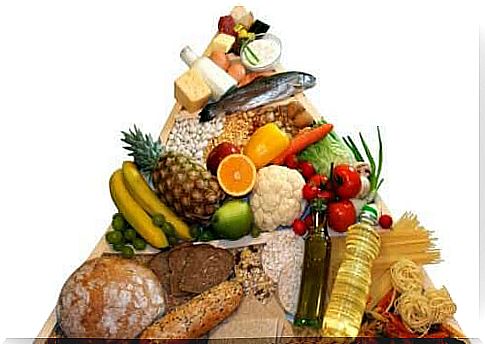The Food Groups According To Their Function

Do you know what the official food groups for nutrition are, according to their functions? There is no doubt that the nutrients in food perform different functions in your body. If you want to learn more about this, this article is for you!
In the same way, identifying which drugs you take daily is a tool you can use to preserve your health and treat as well as prevent metabolic diseases, among other benefits. If you understand this you will be able to improve your diet.
What are the food groups?
Each food contains one or more of the following nutrients: carbohydrates, proteins, fats, vitamins and minerals. In addition, they also contain water, which is important for the body, in varying amounts.
Thus, certain components dominate over others in some foods, which is why international and national food guidelines have determined the following food groups:
- Milk, yogurt and cheese
- Meat and eggs
- Fruits and vegetables
- Oils, nuts and seeds
- Legumes, cereals, potatoes, bread and pasta
- Candy and fat

What are the features of the foods?
Several studies have suggested that the nutrients that make up your diet have energetic, structure-forming and restorative functions. Similarly, they also state that you must follow a varied diet to achieve optimal nutritional status. Below you will find more information about the different food groups.
Foods that provide energy
Energy is the fuel the body needs to live. All metabolic processes require it. In fact, the actions you take on a daily basis, such as walking, moving and breathing, are a few examples.
It goes without saying that you need to eat food to get energy. More specifically, the foods that provide energy are those that contain carbohydrates, such as legumes, grains, potatoes, pasta and sweets. After eating them, your body digests and absorbs them as glucose, which is the main source of fuel.
Fats also have this effect, as they supply twice as many calories as carbohydrates. In addition, oils, nuts, egg yolks and seeds are also energetic foods. The latter release the fatty acids when they are ground or as oils.
Foods that build and maintain the body’s cells
These foods build cellular structures and tissues. Those who have this power contain proteins, such as meat, dairy products and egg whites.
This nutrient is rich in amino acids, which some experts consider important because the body does not produce them. Thus, you need to consume them through your diet. Besides being indispensable in structural synthesis, they also have some other functions.
Foods of animal origin are those that stand out due to their protein content. However, this does not mean that you can not get them through vegetables. In fact, there is scientific evidence that grains, legumes and nuts contain significant amounts of this nutrient.
Those who follow a vegan or vegetarian diet can fulfill their recommended supplements with the help of a professional specialist in this subject.
Tissue formation is an important process that should not be overlooked. In fact, it requires adequate amounts of nutrients, even in restrictive diets that do not include foods of animal origin.
Regulatory or protective function

The action of vitamins, minerals, anti-inflammatory substances and phytochemicals (active ingredients produced by plants) determines this function. The foods that contain them are fruits and vegetables.
However, you can also find them in other sources, such as iron in meat and legumes, as well as vitamins A and D in dairy products. Although the recommended supplements are lower compared to other nutrients, this does not mean that they are less important.
In short, the substances we mentioned play an important role in the body because they act in different metabolic processes. In this sense, some prevent cell oxidation and repair the skin (vitamins C and E), others integrate tissues (calcium in bones and teeth) and others promote cellular reactions (zinc and magnesium ).
Remember this about the food groups according to their function
The combination of the different food groups ensures that you get what you need. If you follow a varied and balanced diet rich in proteins, carbohydrates, fats, vitamins and minerals, you will contribute to your health in general.
In addition to having healthy habits, it is recommended to avoid toxic substances, such as alcohol and cigarettes. In the same way, following an active and non-sedentary life will promote the processes that the substances in your diet must perform in your body.









